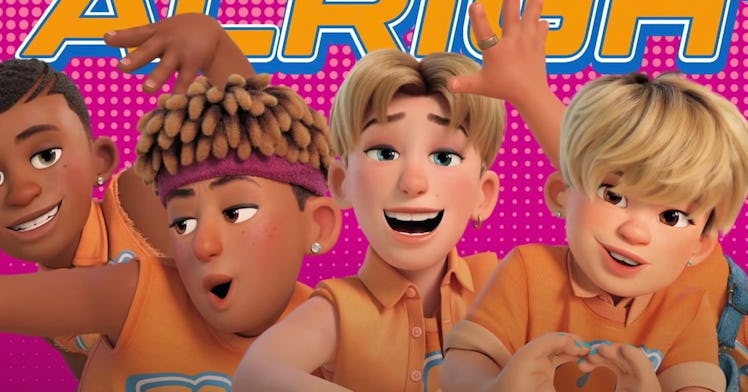The True Brilliance of Turning Red Is Finneas and Billie Eilish’s Fake Boy Band 4*Town
4*Town 4 ever.

Pixar’s delightful comedy Turning Red is distinguished in no small part by its cultural specificity. It isn’t just a sensitive and insightful coming-of-age story about a plucky young hero making the tricky leap from girl to woman. Well, it is that, too, of course. Meilin “Mei” Lee is a Chinese-Canadian thirteen-year-old in 2002 trying to balance her responsibilities to her Conservative, tradition-minded mother Ming (Sandra Oh) with her surging hormones and soul-deep need for independence and autonomy. The film is a sly allegory about female puberty and menstruation with a not-so-subtle title. But this specificity isn’t just about puberty. The music of the era — specifically 2002 — is oddly the secret weapon of the movie’s charm. The movie has been nominated for an Oscar in the 2023 Academy Awards for Best Animated Feature. But it was totally robbed in the Best Original Song category!
We’re talking about the song “Nobody Like U”, which superstar Billie Eilish and her brother/songwriting partner Finneas O’Connell wrote for fictional boy band 4*Town, the freshly scrubbed quintet of teen dreams that Ming and her girlfriends are obsessed with. The fact that the duo just won an Oscar for the James Bond song “No Time To Die,” is notable because let’s face it, they might win next year for “Nobody Like U.”
4*Town is an inspired amalgamation of the prefabricated pop bands masterminded by Lou Pearlman, the corpulent career criminal who gave the world Backstreet Boys, *NSync, and, to a much lesser degree, O-Town, LFO and Take 5 when not operating a blimp-based pyramid scheme that landed him in prison, where he died in disgrace in 2016. Like Pearlman’s shiniest and most appealing creations, 4*Town looks and feels like it was created in a laboratory by scientists intent on creating a band teenage and tween girls would be powerless to resist.
So, it would be easy to make 4*Town a joke. But, refreshingly, the film understands and appreciates what makes a truly superior boy band like *NSYNC spectacularly appealing as well as ridiculous. At its best, boy band pop isn’t just good; it’s goddamn great, if not perfect in its own synthetic, disposable way. 4*Town’s music is polished to a blinding sheen by producers more responsible for the group’s success than the model-singer-actor types making girls scream.
In Turning Red, becoming obsessed with a group of impossibly attractive fantasy figures is a rite of passage for teen and tween girls as well a crucial step in their emotional and sexual development. The members of 4*Town are consequently at once wildly popular targets of teen lust and strangely asexual as if they’d be as hairless and devoid of genitalia as Ken dolls if their fans ever managed to realize their dreams of getting them alone and naked.
For Turning Red, Eilish, who until recently was a massive teen pop star in her own right, and her gifted sibling/collaborator created a note-perfect pastiche that nails the details of prefabricated pop at its highest level.
In that respect, they’re not unlike “Weird Al” Yankovic and The Lonely Island, who are absolute geniuses at pastiches that nail the sound, vibe, and aesthetic of their inspirations. For Yankovic, that meant creating, in the Devo pastiche “Dare to be Stupid” a geek anthem that somehow manages to sound more like Devo than Devo itself.
For Eilish and O’Connell, that means writing a song in the style of *NSYNC bangers like “It’s Gonna Be Me” and “Bye Bye Bye” that it would be easy to mistake “Nobody Like U” for a lost *NSYNC single if you heard it outside the context of the movie. In keeping with the sure-fire formula of millennial-era boy band pop, “Nobody Like U” has just enough Hip Hop flourishes to sound modern and at least a smidgen edgy without scaring parents unnecessarily.
“Nobody Like U” consequently has beat-boxing a la *NSYNC frontman Justin Timberlake, near-subliminal scratches, and a brief rap interlude. The production is a constantly shifting marvel of filters, acoustic guitars, synthesizers, and harmonies.
It’s a lot. But it’s never too much.
This article was originally published on